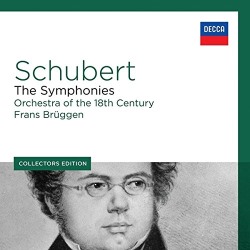
|
Franz SCHUBERT (1797-1828)
The Symphonies
Symphony No.1 in D Major D82 [26:37]
Symphony No.2 in B flat Major D125 [25:15]
Symphony No.3 in D Major D200 [23:49]
Symphony No.4 in C minor D417 Tragic [26:20]
Symphony No.5 in B flat Major D485 [26:54]
Symphony No.6 in C Major D589 [32:30]
Symphony No.8 in B minor D759 Unfinished [26:08]
Symphony No.9 in C Major D944 Great [56:04]
Orchestra of the 18th Century/Frans Brüggen
rec. live, Vredenburg, Utrecht, 1990-96
DECCA 478 7839 [4 CDs: 53:14 + 78:14 + 59:03 + 56:04]
As with most of the sets in Decca Universal's ‘Collectors Edition’, these discs have appeared before in various guises, including a box set from Philips (475 7599) that presented the symphonies as here. However as with all the releases in the Edition, they do warrant being reissued.
It use to be that the symphonies of Schubert were divided in to two groups, those of his youth and middle period, numbers 1-6, which were largely to be dismissed, and those of his mature period, numbers 8 (Unfinished) and 9. However, I tend to agree with Dvořák and find much to ‘marvel’ at in these works - even his teenage attempts at symphonic writing. His Symphony No. 1 in D Major, composed when Schubert was still a student, shows a mastery of the art beyond his tender age. Yes it was at least his third attempt to compose a symphony and perhaps this is why the finished article is the polished work that it is. On this recording the 1st is coupled with the 4th Symphony in C minor “Tragic”, the only one to have been given a name by the composer. This symphony is one of only four that I have managed to experience live, the others being the 5th, 8th and 9th. How I envy the audiences at the concerts at which these recordings were made. Here the performance is strong, and more accomplished than that by The Hanover Band and Roy Goodman, the only other complete set I have. For most of the symphonies Brüggen adopts a brisker tempo than Goodman. Here the 4th is over four minutes quicker, but it really works, and I particularly like his use of the flutes throughout — especially in the final Allegro.
The second disc couples the 2nd, 3rd and 5th symphonies, with only the D Major 3rd, being slightly more relaxed than the Hanover’s. In fact, it is the Fifth Symphony which is the stand-out work here. Said to be the final work that Schubert composed for an amateur orchestra, there is nothing amateurish about this work. One can understand why this is really the only one of his first six symphonies to have a secure place in the repertoire. The Fifth is fresh and lighter in mood, mainly due to its pared-down orchestra, which was probably due to the lack of clarinets, trumpets and timpani in the "friends and family" orchestra at the time. However, Schubert more than makes up for this shortage and produces what many regard as his first symphonic masterpiece.
The third disc offers the listener the 8th and 6th symphonies. While the 6th marks a step up, the complexities of its composition mark this work out as being intended for a professional orchestra. It is the 8th however, which is, along with the 9th, seen as one of Schubert’s symphonic masterpieces. It represents the most performed incomplete work of classical music with hundreds of performances each year, as well as dozens of recordings. Nobody really knows why the work was never completed. It has been suggested that Schubert ran out of ideas or even that after completing two movements felt that he had nothing more to say. The performance is nearly three minutes slower than that of Goodman and most of this occurs in the first movement. However, I prefer the quiet and more deliberate build-up of tension in the opening movement where Brüggen shows true mastery of the orchestra.
As with the Nimbus-Goodman set, the final disc gives us the Symphony No. 9 in C Major, the title “Great” being added by later commentators to distinguish the work from the 6th Symphony which is in the same key. Regarded as Schubert’s finest work for orchestra, the 9th certainly lives up to the billing. It is a magnificent outpouring of the composer’s art and makes you feel sorry for Schubert who never heard it, or any of his other symphonies for that matter, performed by professional forces in his lifetime.
As with all the symphonies, the performance of the 9th is excellent, probably the standout recording of the set. Yes, Brüggen has had his detractors, mainly due to the tempos he adopted, but this is a magnificent set. For me, it eclipses the achievement of the Hanover Band and Roy Goodman. Everyone is likely to have favourite recordings of the final two symphonies performed by larger forces and starry conductors but as sets go this one more than fills gaps.
The booklet notes, whilst short, are excellent and informative and add to the overall enjoyment. The recorded sound is very fine. Indeed it is hard to believe that they were made during live concerts. This box makes a most welcome return to the catalogue and is more that worthy of its place in Decca’s Collectors Edition.
Stuart Sillitoe
 |
 |
|



 All Nimbus reviews
All Nimbus reviews








